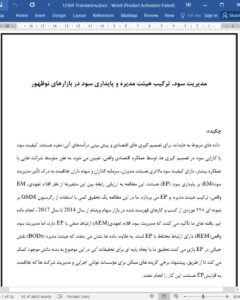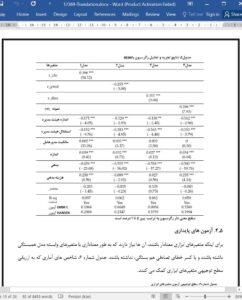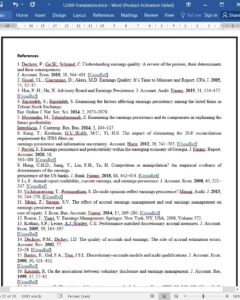Abstract
Income data are useful for making economic decisions and anticipating future revenues. Earning quality, or the utility of earnings in making decisions, is determined by real economic performance. Firms with greater performance should, on average, have higher profits quality. Managers, investors, and scholars are interested in the influence of earnings management (EM) on earnings persistence (EP). This study evaluates the relationship between these variables in terms of accrual, real EM, board composition, and EP. We conducted quantitative research using GMM regression on a sample of 228 listed businesses in the Vietnamese stock market from 2014 to 2017. Our findings indicate that accrual earnings management (AEM) is associated with a negative connection with EP, but real earnings management (REM) is associated with a mixed association with EP. Additionally, the data indicate that board of directors (BODs) play a critical role in EP. Our research contributes to the existing body of knowledge by establishing a foundation for future research in this subject and by proposing some feasible options for functional government agencies and enterprise management interested in enhancing EP.
1. Introduction
Income information is helpful for economic decision making and forecasting future earnings [1,2]. Earnings quality, or the decision usefulness of earnings, results from actual economic performance [1]. Firms with higher performance should, in general, be associated with higher earnings quality [3]. According to the Financial Accounting Standards Boards’ (FASB) conceptual framework, earnings information should assist users in determining the amount, timing, and uncertainty of future cash flows (Statement of Financial Accounting Concepts No. 1). As a result, high earnings quality is a significant contribution to long-term persistence and sustainability of a firm and the effectiveness of the financial market. However, because each proxy assesses a distinct variable component and supports different judgments, there is no single adequate measure for earnings quality [1]. Therefore, in this paper, we decided to use EP to measure earning quality as one of the most off-cited approaches.
6. Conclusions and Implications
This paper explores the impact of accrual-based and real activities EM and board composition on EP in developing country stock markets. Research results show that accrual-based EM has a negative impact on persistence, whereas real activities EM has a positive impact on persistence except for the proxies of production costs. The control variables of the model representing ownership at the enterprise, control mechanism, and business characteristics all have an impact on the persistence with statistical significance.










